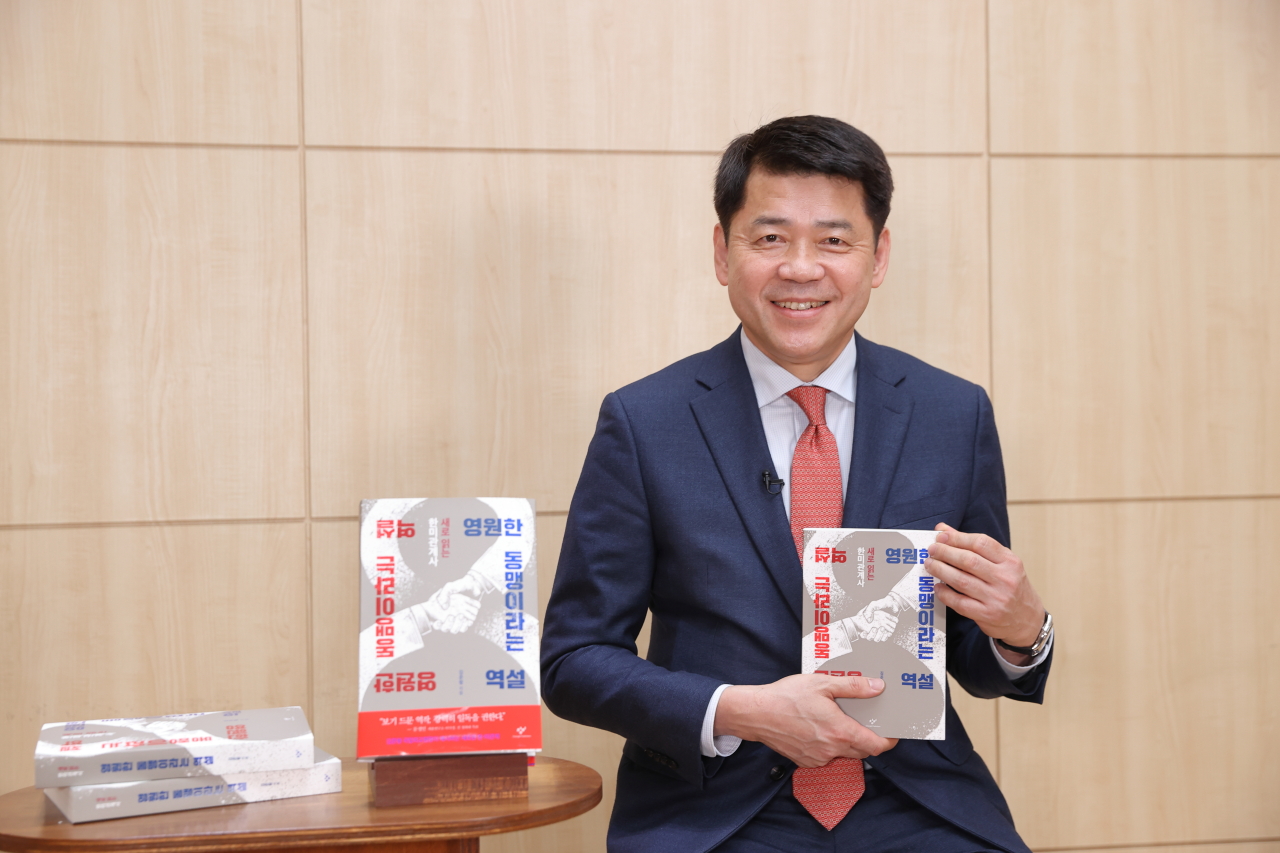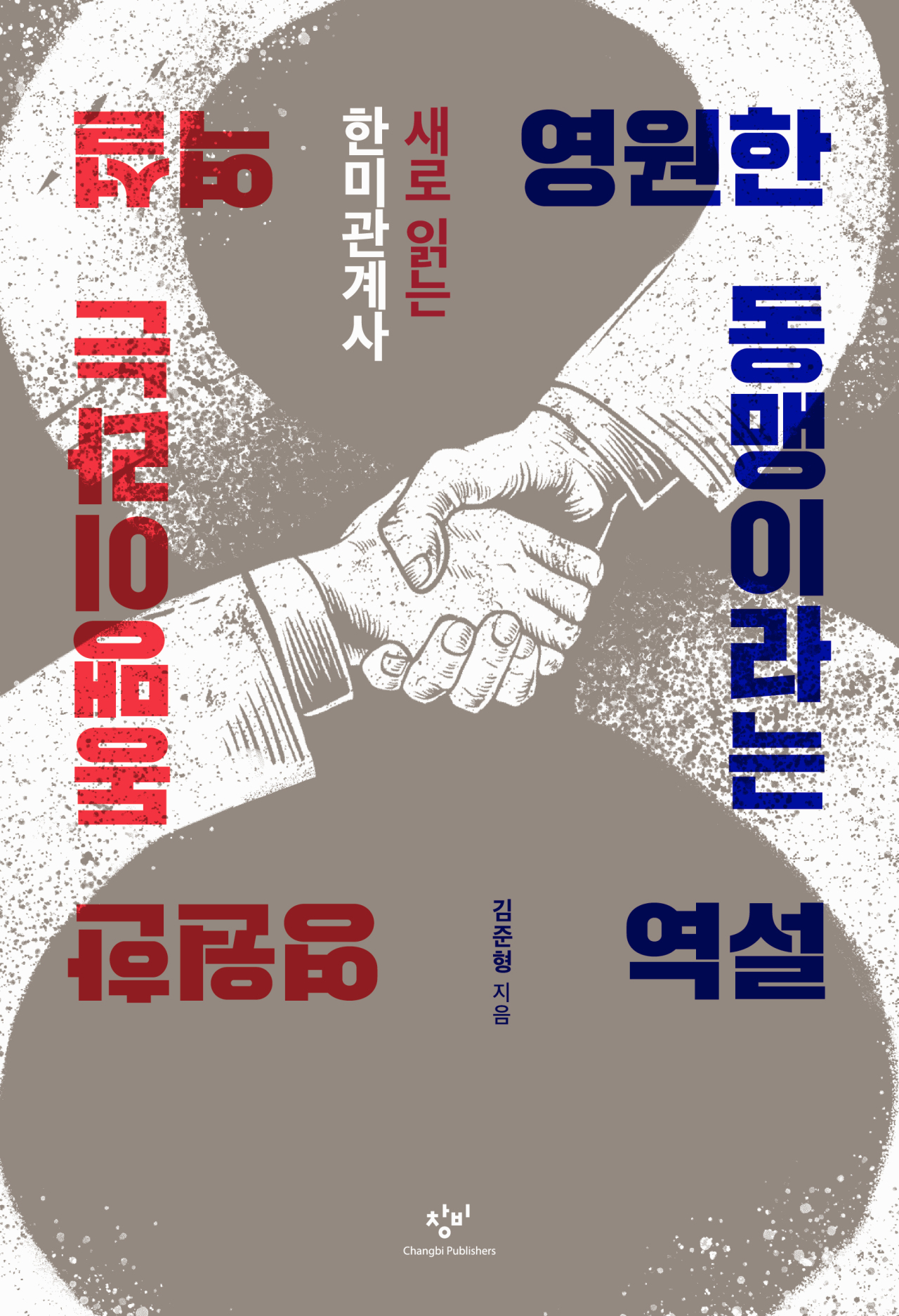 |
KNDA Chancellor Kim Joon-hyung promotes his new book, “The Paradox of the Eternal Alliance,” at an online press conference Tuesday. (Changbi Publishers) |
Korean National Diplomatic Academy Chancellor Kim Joon-hyung chronicles the 150-year-old South Korea-US alliance in his new book, “The Paradox of the Eternal Alliance,” published by Changbi Publishers on Monday.
The KNDA is the state-run institution that trains diplomats and researches international security affairs. Chancellor is a vice minister-level post.
Kim, an expert in international politics and South Korea-US relations who has served as an adviser to Cheong Wa Dae’s Office of National Security, among other institutions, said the book had been in the works for over five years and the timing of its release had nothing to do with current events.
“At the time of the book’s release, I am an official under the Ministry of Foreign Affairs so putting my negative opinions on the South Korea-US alliance is quite burdensome,” said Kim in the book’s preface. “But I think I was able to better analyze the South Korea-US alliance having a dual identity as a scholar and a diplomat rather than having just one point of view, so I am thankful. One thing to note is that the KNDA chancellor position doesn’t deal with secret files and there are no breaches of security or classified information in the book.”
Kim reflects upon the alliance, past and present, saying it has been idolized as if it were a constant, unchanging factor in South Korea’s diplomatic efforts. Although Kim agrees that the alliance is important and stands at the center of South Korean diplomacy, he says he hopes to highlight the things South Korea must overcome within the alliance.
In the book, Kim gives his take on events in the history of the alliance such as plans to turn over wartime operational control to South Korea, the placement in South Korea of the US Terminal High Altitude Aerial Defense missile defense system, the US-China conflict, the increasingly close South Korea-US-Japan military alliance, and talks between the US and the two Koreas.
 |
“The Paradox of the Eternal Alliance” by Kim Joon-hyung (Changbi Publishers) |
The main theme repeated throughout the book is that the South Korea-US alliance should be a means to seek the national interest. In other words, the national interest needs to come first, before the South Korea-US alliance. He says South Koreans need to overcome their “addiction” to the alliance and need to focus on mutual interests for a healthier alliance. Accordingly, he writes, South Korea needs to distinguish between the South Korea-US military alliance and the South Korea-US relationship. He also says the myth of the South Korea-US alliance being “everlasting” needs to be discarded.
“Opinions that are considered to worsen the Korea-US alliance are harshly criticized and the person is considered pro-North Korea,” Kim said Tuesday during an online press conference to mark the release of the book. “There are numerous cases where we don’t react as we should against the US (when it) seeks its national interest. South Korea is under gaslighting from the one-sided South Korea-US relationship.”
Gaslighting is a form of psychological manipulation or abuse, where the abuser is in control and causes the victim to question their own judgment. He uses the term to describe the Korea-US alliance in the book as well.
“The Korea-US alliance was uneven from the beginning,” Kim says in the book. “The US was closer to a new ‘conqueror’ than a ‘liberator’ that freed Korea from 35 years of Japanese imperialism.”
Kim’s views have sparked controversy, to which the Ministry of Foreign Affairs and the book’s publisher quickly responded.
“The chancellor of KNDA wrote his personal opinion and analysis as a scholar who studied international politics and the South Korea-US alliance,” said a statement from the Foreign Ministry on Tuesday. “Our government’s stance on the South Korea-US alliance is unwavering. The South Korea-US alliance is the root and core of our diplomatic and national security policies.”
Kim also set out to defuse the controversy, saying his use of the term “gaslighting” did not pertain to the current state of South Korea-US relations and that the current alliance was as strong as ever.
While Kim chronicles the past 150 years with expertise, the claim that a book by the head of the country’s major diplomatic institution that is critical of the state of the Korea-US alliance and urges a change reflects solely the personal opinion of an academic is not one that can easily be accepted at face value.
By Lim Jang-won (
ljw@heraldcorp.com)









![[Today’s K-pop] Blackpink’s Jennie, Lisa invited to Coachella as solo acts](http://res.heraldm.com/phpwas/restmb_idxmake.php?idx=644&simg=/content/image/2024/11/21/20241121050099_0.jpg)